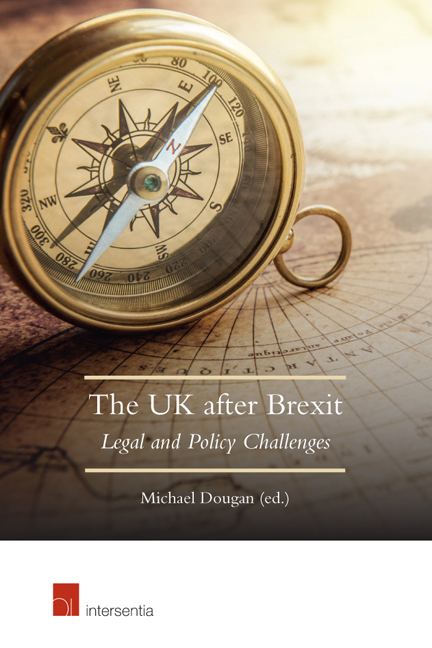Book contents
- Frontmatter
- Contents
- List of Authors
- Editor's Introduction
- Part I Constitutional Issues
- Part II Substantive Policies
- Part III External Relations
- Chapter 11 Membership of the World Trade Organization
- Chapter 12 UK Trade Policy
- Chapter 13 UK Foreign Investment Protection Policy Post-Brexit
- Chapter 14 Brexit and International Peace and Security: A Crisis for Crisis Management?
- Chapter 15 Brexit and Relations between the EU and the UK
- About the Editor
Chapter 11 - Membership of the World Trade Organization
from Part III - External Relations
Published online by Cambridge University Press: 13 October 2018
- Frontmatter
- Contents
- List of Authors
- Editor's Introduction
- Part I Constitutional Issues
- Part II Substantive Policies
- Part III External Relations
- Chapter 11 Membership of the World Trade Organization
- Chapter 12 UK Trade Policy
- Chapter 13 UK Foreign Investment Protection Policy Post-Brexit
- Chapter 14 Brexit and International Peace and Security: A Crisis for Crisis Management?
- Chapter 15 Brexit and Relations between the EU and the UK
- About the Editor
Summary
INTRODUCTION
On withdrawal from the European Union, the United Kingdom's trading relations with the overwhelming majority of its trading partners will be regulated by the law of the World Trade Organization (WTO). While the UK has been a member of the WTO since its entry into force in 1995, it has not had to consider the impact of WTO law on the UK legal system in a meaningful manner as this has been managed and filtered through the EU.
The WTO is an international organisation with a membership of 164 countries and customs unions, and which covers over 95 per cent of world trade. It is home to an institutional framework for trade negotiations, resolving disputes and manging trade relations, as well as a set of comparatively detailed rules to regulate the involvement of governments or public power in the market. While trade law once primarily concerned itself with the regulation of tariff barriers and core principles of non-discrimination, WTO law now extends into a wide range of areas of governmental activity, from the application of taxes and labelling regulation to intellectual property and services.
Given its scope and effect, it is clear that WTO law will play a critical role in the future of the UK's trade relations as well as the direction it takes in national policies. As the UK's default trade law, determining both the ability of the UK to conclude agreements with others, as well as the range of permissible and impermissible acts of the government in matters covered by the WTO, the UK will have to become familiar with its legal and institutional peculiarities. The UK's withdrawal from the EU will mean having to ensure (1) effective representation and engagement at the WTO and (2) compliance with WTO law within the UK legal system. This chapter examines these two aspects of the UK's membership of the WTO. It is not a comprehensive account of all areas of WTO law which would extend well beyond a single chapter, or indeed, single book, but instead aims to highlight a selection of key issues.
- Type
- Chapter
- Information
- The UK after BrexitLegal and Policy Challenges, pp. 225 - 246Publisher: IntersentiaPrint publication year: 2017

